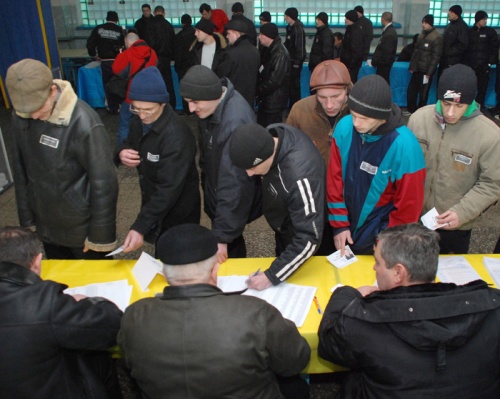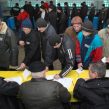
Russia Reflects on the Presidential Elections in Ukraine
Publication: Eurasia Daily Monitor Volume: 7 Issue: 11
By:

The outcome of the first round of elections in Ukraine is fairly clear, despite the usual procrastination with confirming the results, but it could have more impact on Russia’s stalled political modernization than the misanthropic political elite in Moscow expects. Taking a lesson from their utterly counter-productive involvement in the previous elections in fall 2004, the Russian leadership has remained demonstratively indifferent to the political battles in its most important neighboring state. President Dmitry Medvedev has singled out President Viktor Yushchenko as a man he could not do business with, anticipating his imminent political fiasco. Prime Minister Vladimir Putin, on the contrary, has conducted a lot of business with his counterpart Yulia Tymoshenko, but declared that he did not support her in the elections (Rossiyskaya Gazeta, December 3). He also mentioned “special relations” between United Russia and the Party of Regions, but not Viktor Yanukovych, whom he congratulated twice with the victory that never came in 2004.
Yanukovych now radiates confidence that the elections will not slip away, but the Russian public opinion by a considerable margin expects Tymoshenko to snatch victory (www.levada.ru, January 14). The mainstream media in Moscow sticks to the line –also drawn by Putin– that no candidate in the remarkably diverse Ukrainian list could be seen as “pro-Russian” (Ekspert, January 14). This impartial attitude reflects the gradually matured acceptance of the political reality of a Ukrainian state that pursues its own interests and cherishes its vision of becoming a part of Europe rather than reintegrating with Russia. Ukraine is still seen as culturally too close to be just another foreign country, yet the disappointment in building a “union state” with Belarus, poisoned by endless economic quarrels and political scandals, informs a progressively sober perspective on the Slavic “post-brotherhood” (www.gazeta.ru, January 11).
The feature of the elections that gains the most attention within the Russian media is the bitter acrimony and tilt towards negative campaigning, which is presented as a consequence of a protracted political crisis created by the “Orange Revolution” (Rossiyskaya Gazeta, January 15). Still, the express-poll by Moscow Echo radio showed that 90 percent of its audience preferred this kind of competitive election to the heavily manipulated quasi-elections held in Russia (Ekho Moskvy, January 15). Irresponsible populism may still dominate in the debates, but experts point to the evolving culture of compromise and the rise of a new generation of politicians, like Sergei Tigipko and Aresniy Yatsenyuk, who try to bridge the “Orange versus blue-white” divide (Vremya Novostei, January 15). Whatever the vitriol in the Russian political bureaucracy about the self-destruction of the “Orange Revolution,” its legacy lives in the uncensored media, the politically engaged populace, and even in the disregard of Russian or, for that matter, Western opinions.
Yet the risk of breakdown in the “winner-takes-it-all” democratic process in the second round of the elections is alarmingly high from Moscow’s perspective. The stakes for Tymoshenko and Yanukovych are in fact greater than they were in 2004, because defeat would mean not only plunging into political oblivion but also painful material losses for interests groups backing the loser (Nezavisimaya Gazeta, January 15). Irregularities are certain to be widespread, however legal instruments are practically unavailable for addressing them since the High Administrative Court is split into feuding factions (www.lenta.ru, January 15). Enthusiastic crowds would hardly assemble to insist upon their choice, but there is much anger within the divided society and this protest can be mobilized particularly if some money is smartly distributed. As the two main antagonists start to marshal their forces towards the decisive battle, tensions will inevitably escalate –and instead of gracefully accepting defeat, the loser might resort to desperate measures. The term “maidan” [online Ukrainian citizens’ action network] might acquire a new, uglier meaning than the cheerful street-party that goes on for weeks defying the weather.
What makes such alarmist predictions more credible is the depth of economic decline in Ukraine, which is one of the worst cases in the global track record of the still evolving crisis. GDP is expected to contract by 15 percent in 2009, and the political paralysis of the government has prevented the approval of any coherent anti-crisis policy, and consequently the country has no state budget for 2010 (RIA Novosti-Ukraine, January 14). Every monthly payment for gas imported from Russia requires another increase in foreign debt, and the IMF had to stop its emergency aid amounting to $11 billion, because it was diverted to political aims (Nezavisimaya Gazeta, January 12). Candidates try to outdo one another in promising economic miracles, but a new leader will have to tackle a disaster of catastrophic proportions, while having a weak mandate and facing an unforgiving opposition.
The Russian leadership is inclined to observe this deepening recession with barely hidden satisfaction maintaining that the chaos is a direct consequence and final proof of the failure of the hated “Orange Revolution.” Putin has made some calculated “goodwill” gestures, like forgiving Tymoshenko the penalty for importing too little gas, but the main target was to make sure that Yushchenko’s electoral support would remain in single digits (Novaya Gazeta, January 15). In comparison, Russia’s own economic problems look rather manageable, while Moscow is not taking into serious consideration the risk of Ukraine’s sovereign default, which might affect the feeble recovery in the Russian economy and trigger the much feared “second wave” of the crisis.
Ukraine, nevertheless, has a chance to overcome the economic downturn and gain new political momentum from the elections leaving behind “Orange” illusions and acrimonious squabbles. If it settles on a recovery track, this example of functioning democracy will inevitably strengthen discontent in Russia against the self-serving political bureaucracy that has established monopoly on power, but is unable to deliver the basic service of governance. Ukrainian media may be spreading too much slander, though it grants space for every opinion; the political competition has not checked the spread of corruption –but it creates a healthy situation when no group controls the outcome and the winner is not known until the last vote is counted. Medvedev and Putin dismiss these lessons as unsuitable for Russian “stability,” but their odd duumvirate performs satisfactorily only in public relations, while the inflexible and deeply corrupt bureaucratic machine sabotages the task of modernization.




